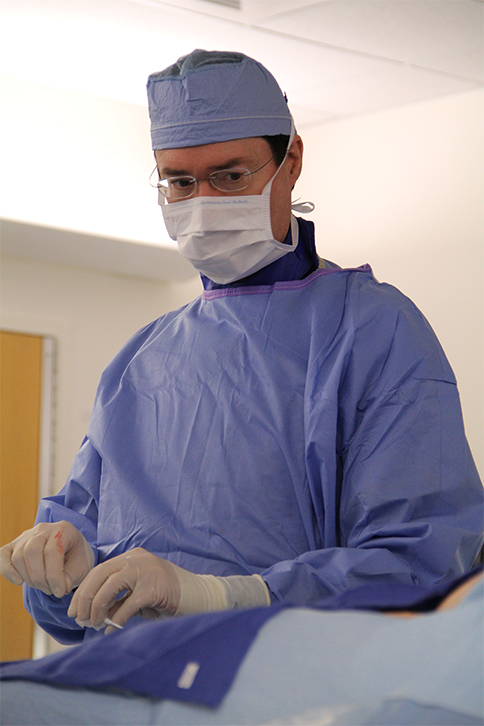Structural Heart Program - WATCHMAN procedure
 The UK Gill Heart & Vascular Institute is one of only five facilities in Kentucky to offer the WATCHMAN implant, an innovative device that lowers the risk of stroke for patients with atrial fibrillation not caused by a heart valve problem.
The UK Gill Heart & Vascular Institute is one of only five facilities in Kentucky to offer the WATCHMAN implant, an innovative device that lowers the risk of stroke for patients with atrial fibrillation not caused by a heart valve problem.
For patients with this condition, known as non-valvular Afib, stroke-causing clots that come from the heart are often formed in the left atrial appendage, or LAA. The WATCHMAN implant addresses this problem by closing off the LAA to keep blood clots from escaping. WATCHMAN is a permanent heart implant that allows patients to stop long-term use of warfarin, a common blood thinner used to treat Afib.
John Gurley, MD, Director of the Structural Heart Program at Gill notes that, patients and physicians finally have a good alternative to oral blood thinners to protect patients from stroke without the risk of bleeding.͞Patients with WATCHMAN also benefit by not having to have regular blood tests or diet restrictions associated with warfarin use.
Gill completed its first WATCHMAN implant in November 2016 and has now performed 60 procedures, including 31 in 2017 alone. Gill is on pace to nearly double that output in 2018 and currently ranks No. 11 in nation for implant volumes.
Afib affects the heart’s ability to pump blood, causing blood to collect in an area of the heart called the LAA. When that happens, blood cells can form a clot and travel to another part of the body, which can stop the blood supply to the brain and cause a stroke.
For people with non-valvular Afib, stroke-causing clots that come from the heart are often formed in the LAA. The WATCHMAN implant – which is about the size of a quarter – addresses this problem by closing off the LAA to keep blood clots from escaping.
Jennifer Vissing, Nurse Coordinator of the Structural Heart Program said being able to offer the WATCHMAN implant to patients at the Gill has been beneficial for everyone involved.
"WATCHMAN gives our patients that are at a high risk for bleeding while taking oral anticoagulants another option to treat their condition and lower their risk of stroke," she said. "In addition, it allows us to participate in clinical trials that provide other LAA therapies to our patients, which helps us better understand the treatment options that will work best for our patients."
Vissing noted that when the Gill first began offering this procedure, patients were completely sedated. Now, however, as procedure times have improved, patients need only minimal sedation.
"Our outcomes with the WATCHMAN have been excellent," she said. "And we’re now able to complete the procedure in a more patient-friendly way, which our patients and their families appreciate."
Learn more about our Structural Heart ProgramSee more stories from 2018 State of the Heart
